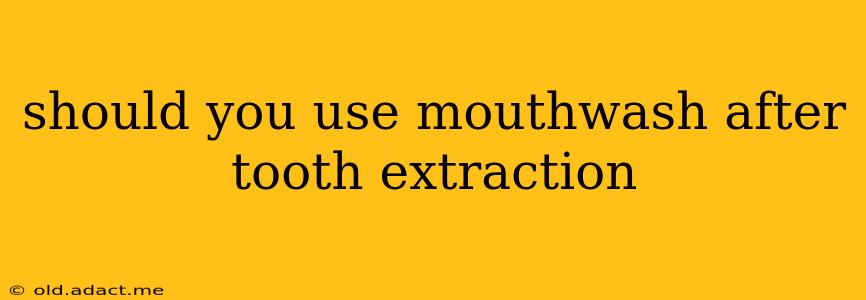Should You Use Mouthwash After Tooth Extraction? A Comprehensive Guide
The question of whether or not to use mouthwash after a tooth extraction is a common one, and the answer isn't a simple yes or no. It depends largely on the type of mouthwash, the stage of healing, and your dentist's specific instructions. While some mouthwashes can aid healing, others can hinder it, potentially leading to complications. This guide will explore the nuances of mouthwash use post-extraction, helping you make an informed decision.
Understanding the Healing Process After Tooth Extraction
After a tooth extraction, your mouth needs time to heal. A blood clot forms in the extraction site (socket), crucial for preventing infection and promoting bone regeneration. This clot is delicate and easily dislodged, potentially leading to a painful and debilitating condition called dry socket. Therefore, any post-extraction care must prioritize protecting this clot.
What kind of mouthwash is safe to use after a tooth extraction?
This is a crucial question. Many commercially available mouthwashes contain alcohol, which can irritate the extraction site and dissolve the crucial blood clot. Alcohol-based mouthwashes should generally be avoided in the initial days following an extraction. Instead, your dentist might recommend a gentle, alcohol-free mouthwash, possibly containing chlorhexidine or other antiseptic agents. This helps keep the area clean and reduces the risk of infection without disturbing the healing process.
When can I start using mouthwash after a tooth extraction?
The timing is key. Most dentists advise against using any mouthwash, even alcohol-free varieties, for at least 24-48 hours post-extraction. This allows the blood clot to form properly and stabilize. After this initial period, a gentle, alcohol-free mouthwash can be used as directed by your dentist, typically twice daily. However, avoid swishing vigorously; gently rinse your mouth and avoid directly aiming the stream at the extraction site.
What are the risks of using mouthwash after tooth extraction?
The primary risk is dry socket. Aggressive rinsing or using an inappropriate mouthwash can dislodge the blood clot, exposing the bone and nerve endings. This is extremely painful and can delay healing considerably. Other risks include irritation of the extraction site, allergic reactions to mouthwash ingredients, and, in rare cases, an increase in the risk of infection if the mouthwash is not properly used or chosen.
What are the benefits of using mouthwash after tooth extraction?
Used correctly, and under your dentist's guidance, mouthwash can offer benefits. Alcohol-free antiseptic mouthwashes can help control bacteria and reduce the risk of infection. This is particularly beneficial if the extraction was complicated or if you have other risk factors for infection. However, the benefits must always be weighed against the risk of disrupting the healing process.
Can I use salt water rinse instead of mouthwash?
A warm salt water rinse is often recommended by dentists as a safe and effective way to clean the extraction site without the potential risks of some mouthwashes. It's a gentle yet effective antiseptic that can help reduce inflammation and promote healing. The salt water rinse should be done gently and sparingly, and never forcefully.
What should I do if I think I have a dry socket?
If you experience intense pain, a foul odor from the extraction site, or notice a visible empty socket, it is crucial to contact your dentist immediately. These are all potential signs of dry socket, which requires prompt professional attention.
Conclusion:
Using mouthwash after a tooth extraction is a nuanced issue. While it can be beneficial in some situations, the risk of disrupting the crucial blood clot and causing dry socket must be considered. Always follow your dentist's specific instructions regarding mouthwash use, and prioritize gentle rinsing and a focus on protecting the healing extraction site. If in doubt, a warm salt water rinse is a safer alternative. Remember, your dentist is the best source of information regarding your specific case and post-extraction care.
